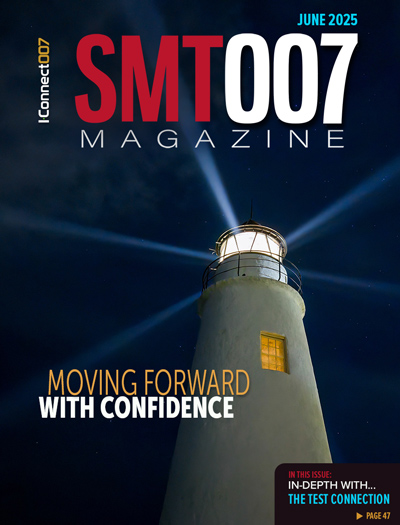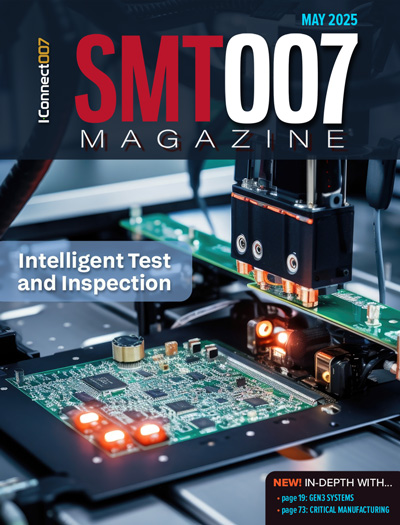-

-
News
News Highlights
- Books
Featured Books
- smt007 Magazine
Latest Issues
Current Issue
What's Your Sweet Spot?
Are you in a niche that’s growing or shrinking? Is it time to reassess and refocus? We spotlight companies thriving by redefining or reinforcing their niche. What are their insights?

Moving Forward With Confidence
In this issue, we focus on sales and quoting, workforce training, new IPC leadership in the U.S. and Canada, the effects of tariffs, CFX standards, and much more—all designed to provide perspective as you move through the cloud bank of today's shifting economic market.

Intelligent Test and Inspection
Are you ready to explore the cutting-edge advancements shaping the electronics manufacturing industry? The May 2025 issue of SMT007 Magazine is packed with insights, innovations, and expert perspectives that you won’t want to miss.
- Articles
- Columns
- Links
- Media kit
||| MENU - smt007 Magazine
The Data Format Effect on Business Costs
May 9, 2022 | I-Connect007 Editorial TeamEstimated reading time: 3 minutes
Nolan Johnson and Barry Matties talked with Axiom’s Rob Rowland and Kevin Bennett about current challenges facing EMS manufacturing. During this conversation, the pair discuss the impact of data file formats on pricing, manufacturing, and quality.
Barry Matties: Does it matter what the data format is or the data coming in?
Rob Rowland: Yes, absolutely. There are three formats we usually get from our customers: Gerber, ODB++, and IPC-2581.
Kevin Bennett: The ideal formats would be IPC-2581 or ODB++ because everything needed for programming is within one file. It only takes a couple of clicks to import those file types. The next step is to merge the bill of materials, and from that point you’re pretty much ready to export that data to the machine you’re going to program it on. But when it comes to Gerber data, which is unintelligent data, much more manual manipulation is required to get it to the same point as importing a comprehensive CAD file, like an ODB++. Gerber makes for a labor-intensive manual process. Basically, you draw a box over any given component footprint and then you must type the reference designator for each location. The extra steps make a huge difference in the time required to complete the offline programming.
Nolan Johnson: How much influence do you have over the file format your customers provide you?
Rowland: In general, we don’t have a lot of influence. Many years ago, we put together a document that articulates the differences between the three file formats and highlights the fact that we really need to get ODB++ or IPC-2581 file formats for programming. Over the years, we’ve tried to educate our customers on the extra programming effort to accurately and efficiently get the file formats right. Our customers try to accommodate our request and most of the time we get ODB++ or IPC-2581 files.
In our business, we also build boards that were designed 15 or 20 years ago and all they have are the Gerber files. As Kevin mentioned, when we do those, which might be 10% of the time, it takes Kevin and our other programmer three to four times longer to program a board with Gerber than it would if we had received either of the other two file formats.
Matties: Does your pricing change based on file format?
Rowland: Yes. If we get Gerber, we try to cover the additional cost. Programming is not an area we try to make a profit on, but we need to be able to cover our cost. If it takes us three to four times longer with a Gerber file, we need to cover the expense that we incur in doing that.
Matties: Do the customers realize that they would save money by changing the file format?
Rowland: Yes, if they’re able to, that is. We have some boards that are so old all they have are Gerber files. We work with what they have available to them. One of our engineers was on the original IPC-2581 committee and is an expert with that file format. He helped some of our customers understand the 2581 format and we showed their design groups how to output the 2581 file format.
Matties: Ultimately, it simplifies your customer’s life as well with fewer questions on the back end and so on.
Rowland: Yes, absolutely. If they give us what we need, then we don’t call them as many times, if at all, because we have what we need vs. having a lot of questions because the file format isn’t very good.
Matties: When we did a survey, Gerber was by far the one people are using most often. They’re familiar with it and there’s no significant penalty to keep using it or changing.
Rowland: Yes, I agree with you. In some cases, people don’t understand there are better file formats for programming than Gerber. Gerber files are best suited for PCB fabrication; this format was never intended for programming SMT machines. That’s why we work with our customers and try to educate them as much as we can so that we get the preferred file formats.
To read this entire conversation, which appeared in the May 2022 issue of SMT007 Magazine, click here.
Suggested Items
Advancing Aerospace Excellence: Emerald’s Medford Team Earns Space Addendum Certification
06/30/2025 | Emerald TechnologiesWe’re thrilled to announce a major achievement from our Medford, Oregon facility. Andy Abrigo has officially earned her credentials as a Certified IPC Trainer (CIT) under the IPC J-STD-001 Space Addendum, the leading industry standard for space and military-grade electronics manufacturing.
Magnalytix and Foresite to Host Technical Webinar on SIR Testing and Functional Reliability
06/26/2025 | MAGNALYTIXMagnalytix, in collaboration with Foresite Inc., is pleased to announce an upcoming one-hour Webinar Workshop titled “Comparing SIR IPC B-52 to Umpire 41 Functional & SIR Test Method.” This session will be held on July 24, 2025, and is open to professionals in electronics manufacturing, reliability engineering, and process development seeking insights into new testing standards for climatic reliability.
IPC Rebrands as Global Electronics Association: Interview With Dr. John W. Mitchell
06/22/2025 | Marcy LaRont, I-Connect007Today, following a major announcement, IPC is embracing the rapid advancement of technology with a bold decision to change its name to the Global Electronics Association. This name more accurately reflects the full breadth of its work and the modern realities of electronics manufacturing. In this exclusive interview, Global Electronics Association President and CEO Dr. John W. Mitchell shares the story behind the rebrand: Why now, what it means for the industry, and how it aligns with the organization’s mission.
Global Electronics Association Debuts; New Name Elevates IPC’s 70-Year Legacy as Voice of $6 Trillion Electronics Industry
06/25/2025 | Global Electronics AssociationToday begins a new chapter for IPC as it officially becomes the Global Electronics Association, reflecting its role as the voice of the electronics industry. Guided by the vision of “Better electronics for a better world,” the Global Electronics Association (electronics.org) is dedicated to enhancing supply chain resilience and promoting accelerated growth through engagement with more than 3,000 member companies, thousands of partners, and dozens of governments across the globe.
I-Connect007 Editor’s Choice: Five Must-Reads for the Week
06/20/2025 | Andy Shaughnessy, I-Connect007It’s been a busy week in this industry, and we have news and articles from the PCB design, fabrication and assembly communities. Some of this news is out of this world. We may be losing the high ground—the really high ground. Columnist Jesse Vaughan explains how the U.S. seems to be falling behind in space, and how this could affect our ability to defend ourselves in the future. We have an update on the U.S.-China tariff talks, which seem to be moving forward, though sometimes at a snail’s pace.


